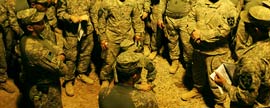Yes. Any subsequent positive urinalysis obtained by the command after completion of an ASAP program can be used for UCMJ and administrative (separation) action. This also applies to misconduct involving alcohol.
Soldiers who test positive for illicit drugs must be processed for separation IAW paragraph 14-12c(2)(b), AR 635-200.
Also, ASAP regulation AR 600-85, para 1-7c(7) states:
Separation initiation authorities, in accordance with AR 635–200 and AR 600–8–24 retain their authority to make personnel decisions except that initiation of administrative separation is mandatory for all Soldiers identified as illegal drug abusers, for all Soldiers involved in two serious incidents of alcohol-related misconduct within 12 months and for all Soldiers involved in illegal trafficking, distribution, possession, use, or sale of illegal drugs.
The situations above only require that separation action be initiated. The separation authority can retain the Soldier if so desired. The AR continues…
Additionally, when a Soldier tests positive for illicit drugs a second time or is convicted of driving while intoxicated/driving under the influence a second time during his/her career, the separation authority shall administratively separate the Soldier unless the Soldier is recommended for retention by an administrative separation board or show cause board (if eligible), under the provision of AR 635–200, or is retained by the first general officer in the chain of command who has a judge advocate or legal advisor available or initiation authority for an officer show cause board under the provisions of AR 600–8–24.
These parts are key. The separation authority must separate the Soldier if the Soldier tests positive for drug uses or is convicted of DUI twice in a career unless a separation board recommends retention or the Soldier is retained by the first General Office in the chain.
An enlisted Soldier must have over 6 years of active service or have been notified of an Other Than Honorable separation to be eligible to have their case heard before a separation board.
Disclaimer: I am not an attorney and any views presented are my own and are not to be
interpreted as legal advice. Furthermore, my views do not necessarily
represent the views of DoD or its Components.














